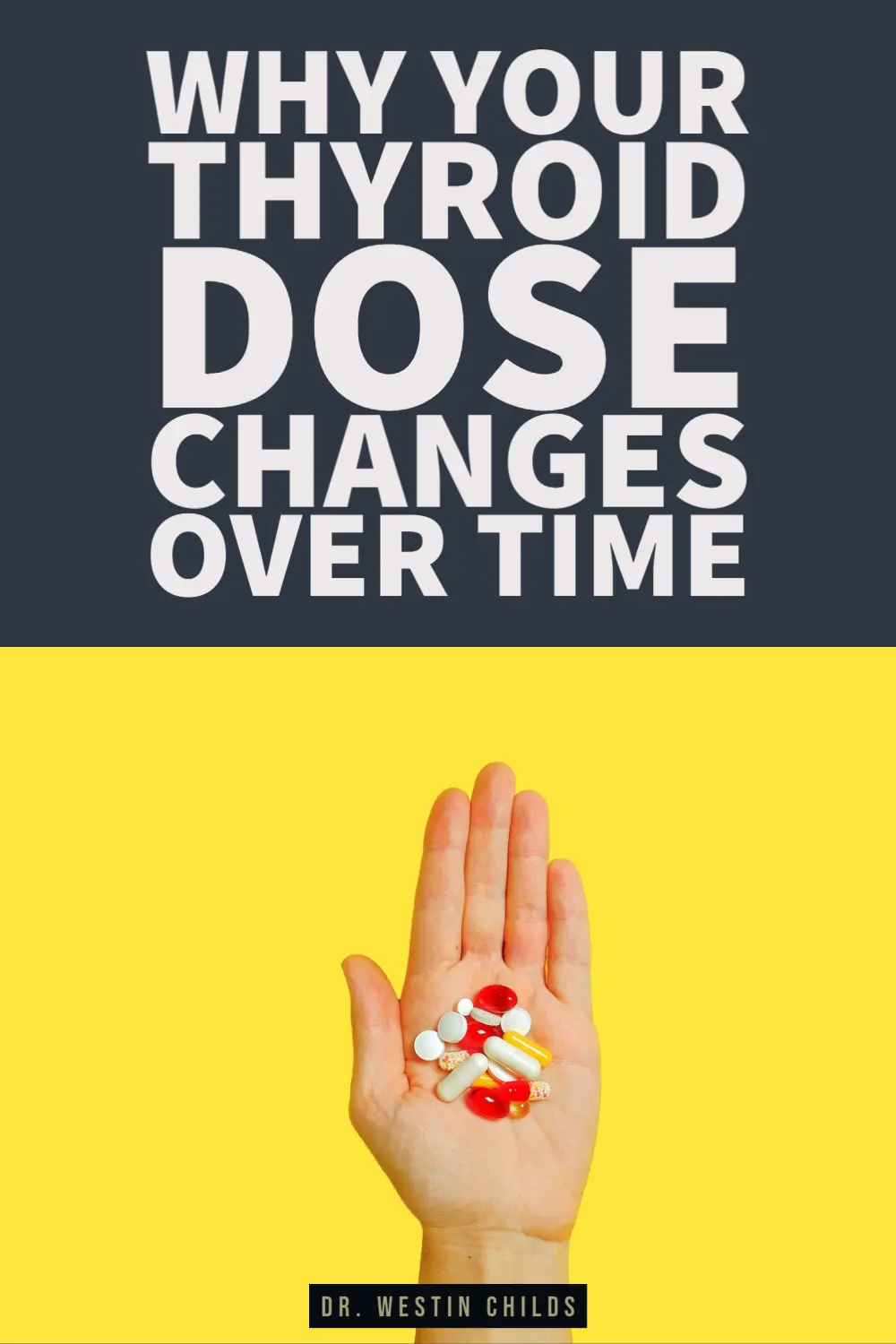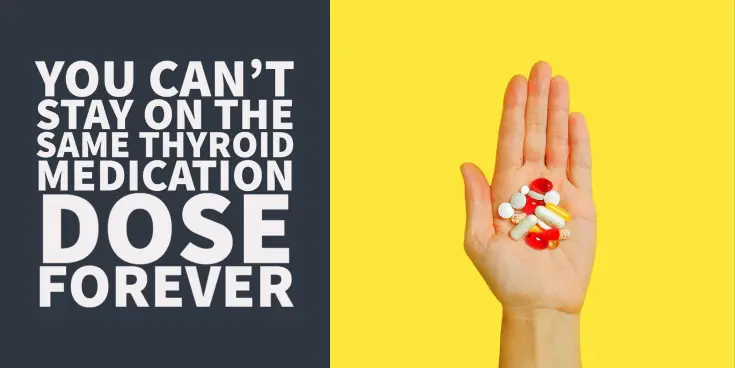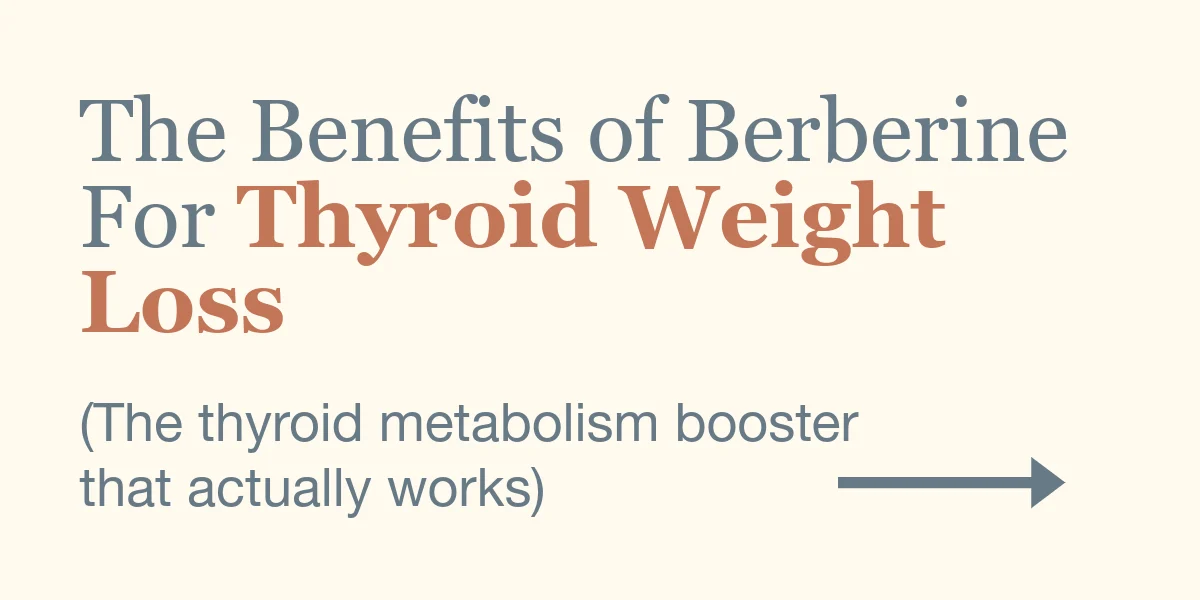It might come as a surprise to hear that your dose of thyroid medication will probably need to be changed constantly throughout your life.
In other words, it’s very unlikely that you will be on a “stable” or “constant” dose of thyroid medication for the rest of your life.
In this article, we are going to explore why that is the case and discuss the variables that influence your thyroid dose so you can be on the lookout for them.
And, by the way, the information found below applies to ALL types of thyroid medications!
It doesn’t matter if you are taking levothyroxine, Synthroid, NDT, or T3 only.
You can be taking any of these medications (at any dose) and still require changes to your medication over time.
DOWNLOAD FREE RESOURCES
Foods to Avoid if you Have Thyroid Problems:
I’ve found that these 10 foods cause the most problems for thyroid patients. Learn which foods you should avoid if you have thyroid disease of any type.
The Complete List of Thyroid Lab tests:
The list includes optimal ranges, normal ranges, and the complete list of tests you need to diagnose and manage thyroid disease correctly!
Thyroid Dosing is Not Constant
Can you expect to start on thyroid medication, reach your optimal dose, and then stay there for the rest of your life?
If only it were that simple!
But, for some reason, most people are led to believe that this is the case.
I get questions all of the time from patients who have found an ideal dose for them, let’s say 100mcg of T4 or 120mg of Armour thyroid, and then they are surprised when their labs change or they need to adjust their medication.
They often ask me, “Is this normal? I don’t understand why this would be happening.”
The answer is that YES it is normal and the reason has to do with how thyroid medication interacts with your body and cells.
Remember back to some of the more basic principles of thyroid hormone physiology:
In a healthy state (we will talk about what happens when you start taking thyroid medication), your thyroid gland produces thyroid hormone at a fairly steady rate (1).
This means that day in and day out your thyroid gland is constantly pumping out thyroid hormone to meet the demands of your body.
Because thyroid hormone plays an integral role in many hormone systems such as your metabolism (2) and heat production (3), even though it produces a steady rate of thyroid hormone, the demand for thyroid hormone may go up or down depending on the situation.
We are going to talk about the specific scenarios which can increase the demand for thyroid hormone in your body later in this article but for now, just realize that it occurs.
Can you imagine what happens to your body when you start dieting or dramatically reducing your calories?
The demand for thyroid hormone drops (4).
Can you imagine what happens when you are sick or have a fever or aren’t as active as you would be normally?
The demand for thyroid hormone would obviously drop in these cases.
After all, it doesn’t make sense for your cells to work overtime if you are sick when there are more pressing issues for your body to deal with (infections, viruses, etc.).
It’s easy to imagine a scenario, then, in which the amount of thyroid hormone your body needs at any given time is constantly changing.
And the demand for these changes is met by how much thyroid hormone your thyroid gland produces AND by how active your cells are at converting T4 to T3.
Makes sense, right?
It’s pretty straightforward when you think about it this way but how does this fit into the scenario when you take thyroid medication?
Thyroid Medication Suppresses Thyroid Function
What I just explained happens only in those with a healthy and fully functioning thyroid gland.
Once you start taking thyroid medication the whole scenario changes.
You lose the flexibility that your own body has to adjust thyroid medication on a daily basis and, instead, you place your body on a rigid schedule and dose.
Whenever you take any hormone, but this is also true of thyroid hormone, your body starts to naturally shut down the production of that hormone (5).
So, as you provide your body with thyroid medication by mouth, that medication will be absorbed and feedback to your brain which tells your thyroid that you don’t need to produce as much hormone.
Practically, this is seen as a drop in your TSH level.
TSH, which stands for thyroid-stimulating hormone, is important for STIMULATING the thyroid gland! (This should come as no surprise to most of you).
As the levels of TSH fall, the stimulation of your thyroid gland also falls.
Eventually, you will reach a point where your brain is no longer effectively communicating with your thyroid gland through TSH.
When this happens, your body is no longer able to make those changes to how much thyroid hormone you need on a day-to-day basis.
And virtually every thyroid patient who is taking thyroid medication is in this situation.
So it’s no wonder that these patients will need to constantly make changes to their medication throughout their life.
Their thyroid gland is no longer performing this function so that means YOU (the thyroid patient) must act as your thyroid gland and take over that job.

This means you will be responsible (and by you, I mean both you and your doctor) for adjusting your dose based on the scenarios that will influence the demand for thyroid hormone.
With this in mind, we can talk about what things you should be looking out for, as a thyroid patient, which may influence that demand.
If you know what to look out for then you won’t be caught unaware when they occur.
Thyroid Dosing for Beginners
So far I’ve really been speaking specifically to those people who are taking thyroid medication and have already found their ideal dose.
It may be interesting to know, for those reading this, that most thyroid patients are probably not at their ideal dose.
You’ll know you are there because not only will your thyroid labs be stable but you will also feel optimal (meaning you won’t experience the symptoms associated with hypothyroidism).
If you are not there yet then you can use some of the principles found in this article to help guide you to that dose.
If you are someone who just started taking thyroid medication then you should be aware that it may take several weeks to months to find whatever that ideal dose is when you first start thyroid medication.
The factors which influence your dose of thyroid medication will still apply to you, whether you’ve been taking thyroid medication for a decade or whether you’ve been taking it for 6 weeks.
Factors which May Influence your Dose
Let’s say you are someone who has been on a steady dose of thyroid medication for a year or more.
Now let’s assume that you have found out recently that your dose of thyroid medication needs to be adjusted.
What could potentially explain the reason for this change?
There are many, but I’ve included just a few below for reference:
- Age – Most people agree that the demand for thyroid hormone decreases as you age. I find this to be mostly true but not universally true.
- Stress – Stress, from any and all causes, can impact how much thyroid hormone you need. More stress typically results in increased demand for thyroid hormone (but not always). Occasionally, stress may necessitate a reduction in your dose.
- Weight gain – Recent weight gain, from any cause, may increase the demand for thyroid hormone in your body. The more mass and tissue you have the more likely you are to need more thyroid medication. If you suddenly or abruptly gain 20-30 pounds you should look at your thyroid dose.
- Weight loss (6) – Rapid and unhealthy weight loss may lead to an increase in demand for thyroid hormone while a healthy and sustained weight loss may result in a reduction in your total dose. It all depends on how you are losing weight and whether it is healthy or not.
- Dieting – Calorie restriction, especially if used for the purposes of weight loss, may impact how much thyroid medication you need. Typically, the more you calorie restrict the more your body will need T3. You may also find that you have high levels of reverse T3 with calorie restriction.
- Chronic medical conditions
- Supplements – Have you started taking any new supplements? These may interfere with thyroid medication directly or with absorption which may necessitate changes to your medication. In addition, some supplements such as the ones that I recommend may help naturally improve thyroid function. If this occurs you may find that you need a smaller dose.
- Prescription medications – Prescription medications can also have either a positive or negative effect (7) on your thyroid medication. Not unlike supplements, it really depends on what you are taking and why. But you should be aware that starting new medications may interfere with your thyroid meds.
- GERD & other intestinal issues (8) – Gastrointestinal issues may negatively influence your thyroid medication by interfering with absorption.
- The severity of thyroid condition – Certain thyroid conditions, I’m looking at you Hashimoto’s thyroiditis, can worsen over time unless you are able to stop their progression. If you have Hashimoto’s, though, be aware that you may need more medication as your disease progresses.
- Systemic inflammation – Inflammation can reduce how effectively you convert T4 to T3 (9).
These factors aren’t necessarily listed in terms of importance but I can tell you from my own personal experience that stress and weight changes (weight loss or weight gain) probably play the biggest role.
I constantly remind my patients who are losing weight, especially those who have lost more than 50 pounds, that they are a completely different person than they were 50 pounds ago from a metabolic standpoint.
Blood pressure, cholesterol, metabolic function, thyroid function, etc. will ALL be impacted by changes in weight!
Don’t be surprised, then, if you require less thyroid hormone during weight loss (assuming you lose the weight the right way).
It should be noted, however, that if you lose weight the wrong way you may need more thyroid medication to compensate for damage you may have done to your metabolism.
Stressful situations, such as those which just randomly occur in life, also seem to play an important role.
I can’t tell you the number of patients that I’ve seen who need medication adjustment due to things like divorce, stress related to their children, acting as a caretaker for a family member, and the death of loved ones.
These are obviously huge stressors and life events and can have a dramatic effect on both thyroid function and cortisol levels so don’t be surprised if you need more or less medication during these events.
Staying on Top of Thyroid Lab Testing
One of the most important things you can do as a thyroid patient is to simply keep an eye on your thyroid function.
And the way you do that is by regularly checking your thyroid lab tests.
Your thyroid lab tests, if coupled with your symptoms, can be a great way to keep an eye on your medication and your dose.
Your labs can and should act as a warning sign for trouble and will help you make any decisions.
Of course, this assumes that you are getting the right lab tests and looking at factors such as T4 to T3 conversion, reverse T3, inflammatory levels, and thyroid antibodies.
If you are not getting all of these then you will have a hard time figuring out how to adjust your medication appropriately when the time comes.
How often do you need to be checking your lab tests?
Well, in the beginning, when you first start taking your medication, you may need to get your labs tested as frequently as every 6 to 8 weeks.
But, as time goes on, you can stretch out the interval to every 3-6 months depending on your circumstances.
I find that a good way to approach lab testing, once you’ve been stabilized on a dose, is to do a complete thyroid lab panel every 6 months (bi-annually) and smaller spot checks in between as necessary.
If I find that my patients are feeling poorly or going through a stressful time then I will pull the trigger and have them spot-test certain lab tests such as total T3, free T3, or reverse T3.
Do not fall into the trap of thinking that you don’t need to keep an eye on your lab tests if you are “stable”.
Because eventually you will start to feel poorly and these changes could have been identified early if you had been checking your lab tests at some interval.
A word of caution:
Don’t be afraid to second-guess your lab tests if you are feeling great!
You should always be looking at your lab tests in the setting of your clinical symptoms (meaning how you are currently feeling).
If your lab tests look “bad” but you are feeling “great” then re-test your labs before you make any serious changes.
Lab tests are by no means perfect and there are plenty of times (I’ve seen them) when they are inaccurate due to things like interference from supplements (biotin being one), or from taking your medication at the wrong time relative to when you get your labs drawn.
Tons of relatively minor things can have a big impact on the validity of your lab tests (10).
Conclusion
Should you expect that you will need to adjust your thyroid medication dose many times throughout your life?
The answer to this question is obviously yes.
While I am not an advocate of needlessly adjusting your dose, you should be aware that there are MANY factors (some out of your control) that may influence how much you need at any given time.
Even if you are on a stable dose of thyroid medication and even if you’ve been on that dose for years, you should still be checking your lab tests at least every 6 months.
Doing so will help you identify early changes and allow you to be on top of those changes before they dramatically impact your symptoms or quality of life.
Now I want to hear from you:
Are you someone who is on a steady and stable dose of thyroid medication?
If so, what is that dose, and how long have you been on it?
Are you someone who has needed to adjust their medication because of some sudden change?
If so, did you need to go up or down or are you still figuring it out?
Leave your questions and comments below to keep the conversation going!
Scientific References
#1. https://www.ncbi.nlm.nih.gov/books/NBK28/
#2. https://www.ncbi.nlm.nih.gov/pmc/articles/PMC4044302/
#3. https://www.ncbi.nlm.nih.gov/pmc/articles/PMC209345/
#4. https://www.ncbi.nlm.nih.gov/pubmed/12055988
#5. https://www.ncbi.nlm.nih.gov/books/NBK278940/
#6. https://www.ncbi.nlm.nih.gov/pmc/articles/PMC3887425/
#7. https://www.ncbi.nlm.nih.gov/pubmed/1688102
#8. https://www.ncbi.nlm.nih.gov/pmc/articles/PMC4767717/
#9. https://www.ncbi.nlm.nih.gov/pmc/articles/PMC4802023/
#10. https://www.ncbi.nlm.nih.gov/pubmed/30215224








